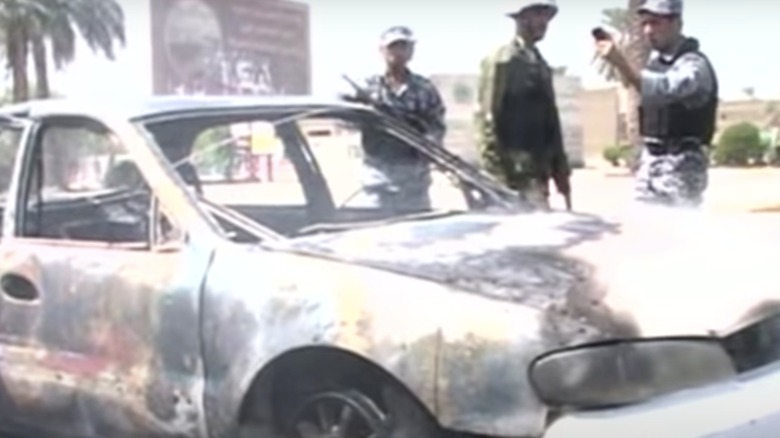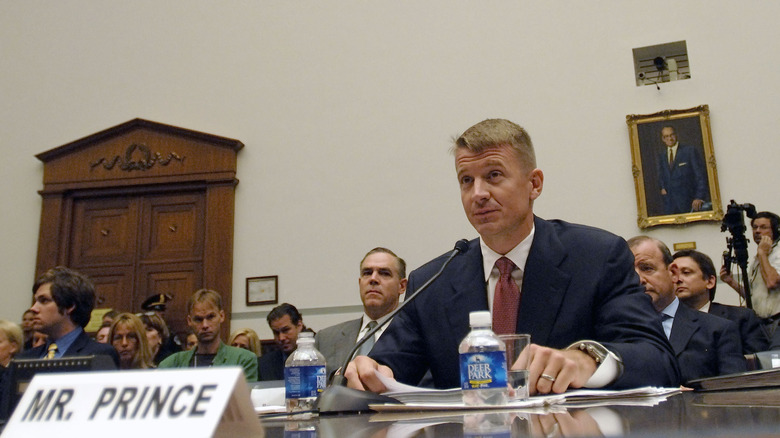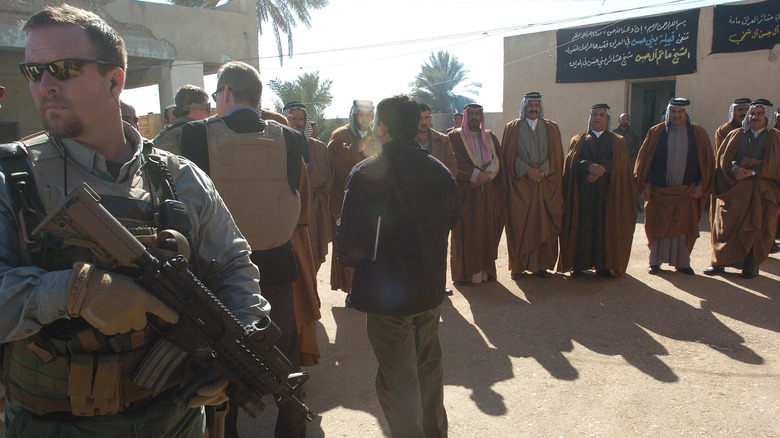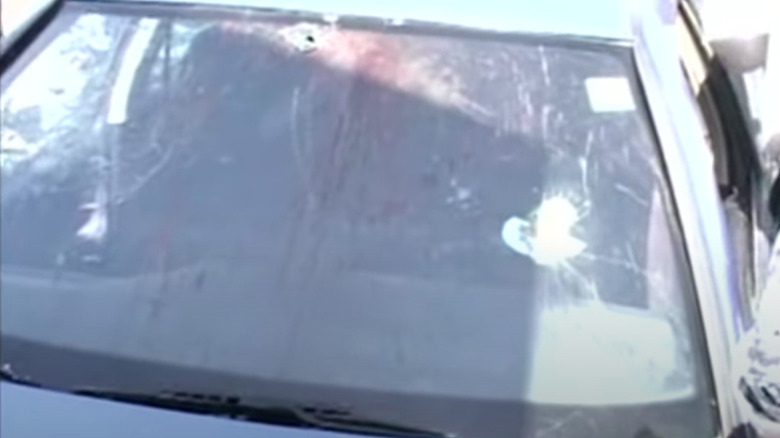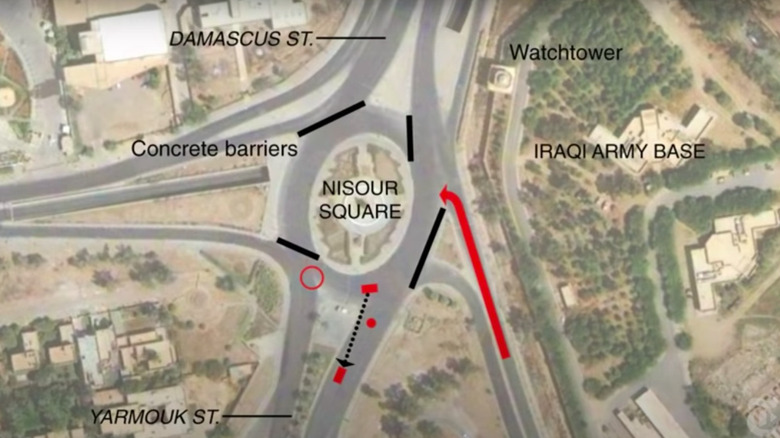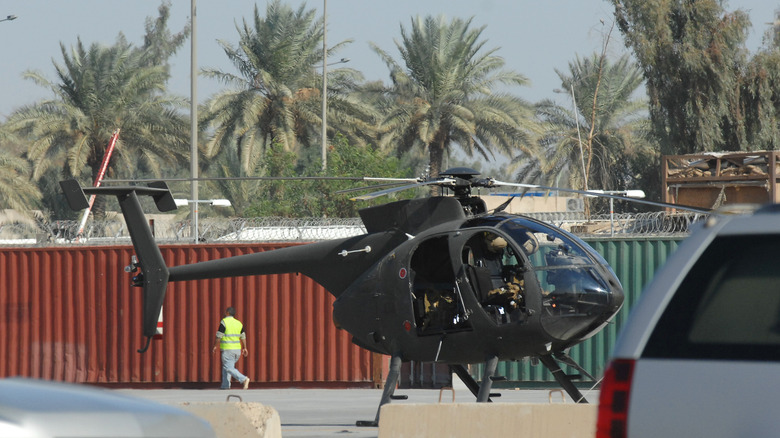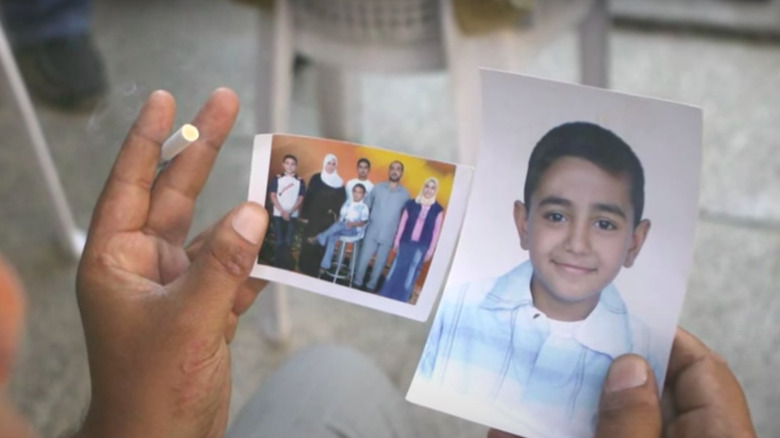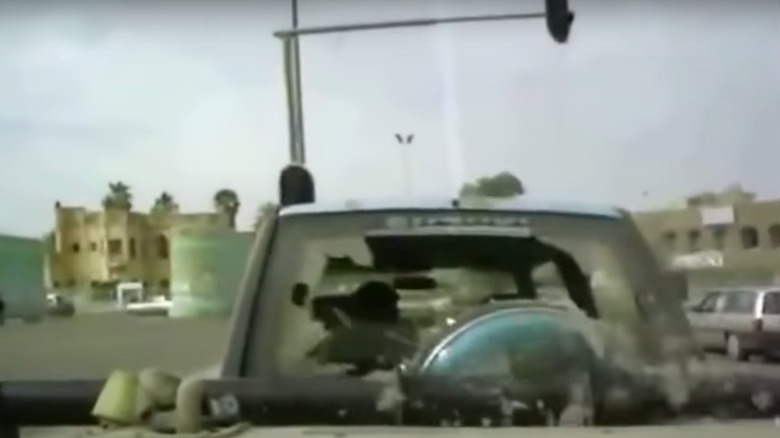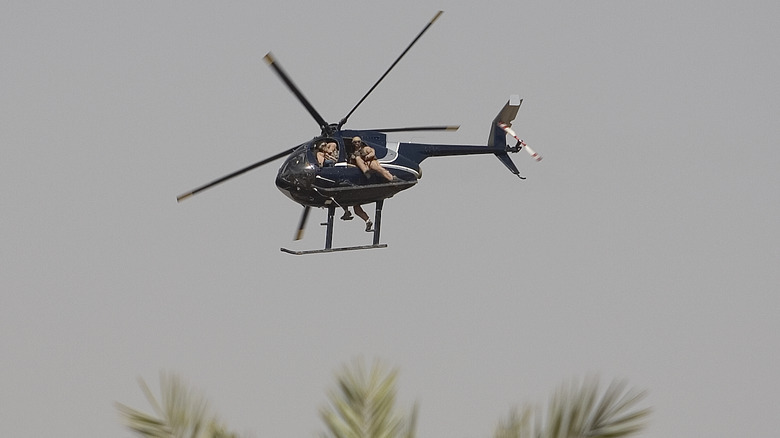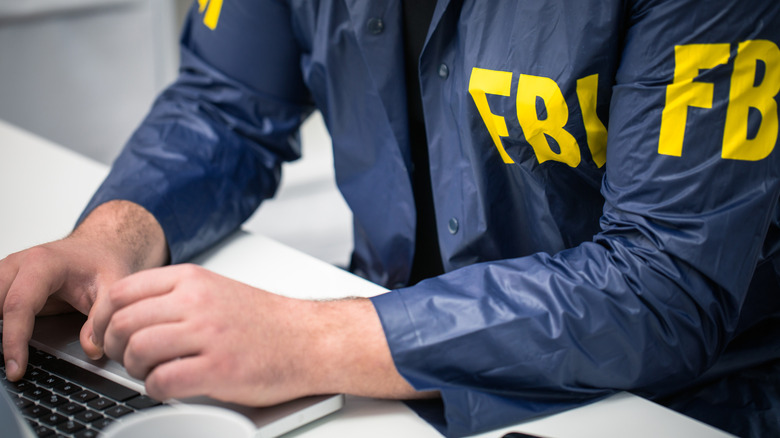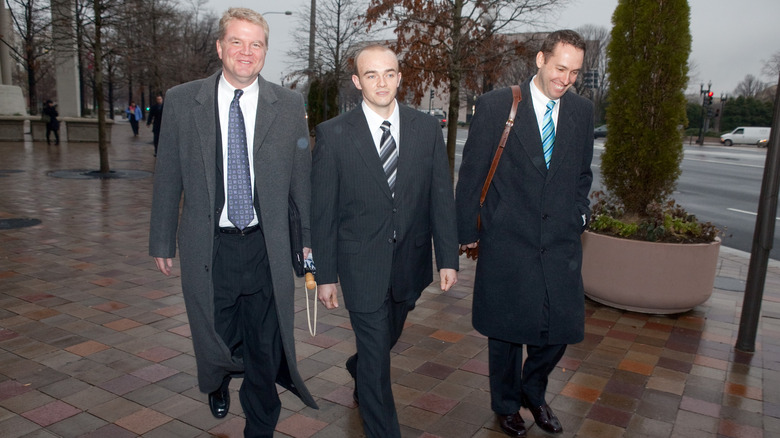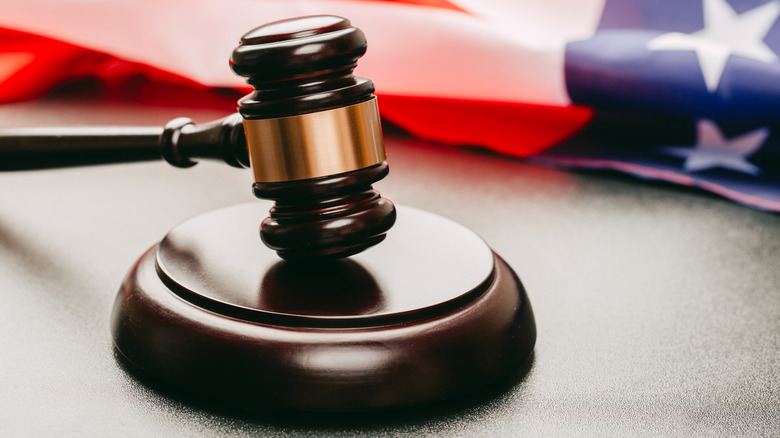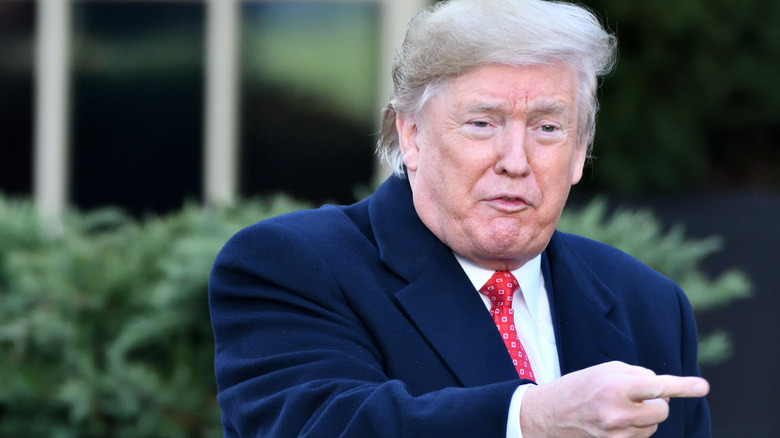The Untold Truth Of The Blackwater Massacre
For several years, a private security firm known as Blackwater Security Consulting received an unprecedented level of funding and incredibly limited oversight from the United States. While they weren't the only private contractor to provide military security, the name Blackwater would soon be so notorious that the company would change their name.
Despite being heavily involved with the United States' military involvement in Southwest and Central Asia, Blackwater was often harmful and rarely helpful. In some instances, like in 2004 when Blackwater members were hired to locate and assassinate top Al-Qaeda operatives, they failed to capture or kill anyone. Other times, Blackwater guards left a trail of civilian casualties.
One such incident is the Blackwater massacre, also known as the Nisour Square massacre. The incident led to at least five investigations and although the Blackwater guards repeatedly claimed that their actions were justified, several of them came to the opposite conclusion. And despite subsequent trials, it's unclear if the victims of the massacre and their families got the justice they deserve. This is the untold truth of the Blackwater massacre.
What is Blackwater Security Consulting?
Blackwater Security Consulting, also known as Blackwater Worldwide, was founded in 1997 by Al Clark and Erik Prince as a private security firm. Initially, they worked providing training support to law enforcement and the justice department, but as Prince once stated, their "corporate goal [was] to do for the national security apparatus what FedEx did to the postal service." Essentially, Prince wanted a "free-market version" of military training.
In 2002, Blackwater received its first contract from the United States government. NPR reports that sometime after the Al-Qaeda bombing of the USS Cole in Yemen in October 2000, where 17 sailors were killed, Blackwater won a $46 million contract from the U.S government for "training sailors in counterterrorism." After the September 11th attacks, Blackwater expanded their security-related work and followed the U.S. military into Afghanistan. And after the United States invaded Iraq in March 2003, Blackwater won a $25 million contract to provide security for L. Paul Bremer, an American diplomat who led the transitional government following the invasion. Blackwater was even hired by the Department of Homeland Security during Hurricane Katrina in 2005, and according to PBS, collected "more than $70 million in hurricane-related contracts."
Once their name was associated with the Nisour Square massacre, Blackwater ended up changing its name to Xe Services. As of 2021, their name is Academi after being taken over by an "unnamed group of private investors."
A contract to protect American diplomats
With the contract to provide security for L. Paul Bremer, Blackwater essentially "cement[ed] its presence at the center of conflict in Iraq," per PBS. Between 2004 and 2008, the State Department ended giving Blackwater more than $1 billion in contracts. Their first contract, awarded in June 2004, was for $100 million for one year. This contract ended up being extended into 2006 and the total cost of that single contract came out to over $300 million.
However, according to the Joint Audit of Blackwater Contract, the State Department offered little-to-no oversight of Blackwater's performance or cost, and often monthly invoices were "paid without adequate review of support documentation." And despite numerous failures to comply with its security contract, including a failure to maintain the required number of security specialists, the State Department never sought out the $55 million in penalties that Blackwater should've been charged. The audit also revealed that Blackwater overbilled at least $70,000 in travel costs.
Blackwater's contracts for protecting American diplomats also weren't limited to Iraq. They were also contracted for personal protective services in Afghanistan, Bosnia, Haiti, Israel, and Palestine.
Reviewing Blackwater's activities
By 2007, the State Department started reviewing Blackwater's $1 billion contract and they discovered a slew of misconduct. According to Vox, investigators Jean C. Richter and Donald Thomas Jr. discovered, among other issues, that migrant workers were being used as guards for the Blackwater compound and Blackwater guards had neglected to even give them beds to sleep on in their living quarters. In addition, the vehicles that were meant to protect diplomats were "poorly maintained," and during one party, four drunk Blackwater guards had crashed a $180,000 armored vehicle into a concrete barrier.
The New York Times reports that when Richter confronted Daniel Carroll, Blackwater's Iraq project manager, about this on August 21, 2007, Carroll became incredibly aggressive and told Richter "that he [Carroll] could kill me [Richter] at that very moment and no one could or would do anything about it as we were in Iraq."
According to the memo Richter wrote to State Department officials in Washington after the incident, "Mr. Carroll's statement was made in a low, even tone of voice, his head was slightly lowered; his eyes were fixed on mine. I took Mr. Carroll's threat seriously. We were in a combat zone where things can happen quite unexpectedly, especially when issues involve potentially negative impacts on a lucrative security contract." Two days after the meeting with Carroll, Richter and Thomas were told by an embassy official to "leave Iraq immediately."
A car bomb goes off
On September 16, 2007, a car bomb went off in Baghdad, Iraq, near the Izdihar Compound, where a U.S. diplomat was meeting with Iraqi officials, at approximately 11:53 AM. A Blackwater team was already there, with the diplomat, who ended up being escorted back to the International Zone without any incident.
Around this time, another Blackwater team of 15 guards known as Raven 23 headed out of the International Zone to offer support, despite the fact that, according to United States v. Slough, they were given an order "not to leave the Green Zone [also known as International Zone]." Raven 23's commander Jimmy Watson reportedly made the "tactical decision" to go to Nisour Square and block traffic for an evacuation route. They arrived at the square while driving on the wrong side of the road.
In Nisour Square, the Blackwater team later claimed that they were "engaged with small arms fire" by an "estimated 8-10 persons." The Blackwater team also claimed that some of the "aggressors" were dressed like Iraqi Police as well as civilians. However, as The New York Times reports, "not one witness heard or saw any gunfire coming from Iraqis around the square." Instead, it appears as though the massacre was started by a single bullet fired by Nicholas Slatten, a Blackwater guard.
Firing on civilians
Around midday on September 16, 2007, Ahmed Haithem Ahmed and his mother Mohassin were driving to the hospital to pick up Ahmed's father, Haythem, who worked as a pathologist. In an instant, Ahmed was shot through the head. As he slumped forward, his weight on the accelerator meant the car kept moving. Ali Khalaf Salman, a traffic cop who was there, recounted seeing an American shoot Ahmed. Salman ran over to the car and as he raised his hand to stop the shooting, the Blackwater guards responded by shooting Mohassin dead as she clung to her son, reports NPR.
According to The New York Times, after the initial gunfire on the first car, the Blackwater guards "unleashed an overwhelming barrage of gunfire" onto Iraqi people who were trying to flee. A rocket grenade was fired into one of the cars, killing its driver. The Intercept reports that others who tried to run for cover were killed by machine gunfire. The Blackwater guards also shot at cars, taxis, and buses. Human Rights Watch reports that some helicopters above ever started shooting at the street below. Although Blackwater denies using helicopters, "at least one [of] the car roofs had bullets through them."
After roughly 20 minutes of shooting, the Blackwater guards convoy drove out of the square, leaving multicolored smoke bombs in their wake. Some witnesses also claimed that the same Blackwater team subsequently opened fire on another line of traffic after the shooting in Nisour Square.
A tragic scene
In the span of 20 minutes, 17 Iraqi people were killed and another 24 were left wounded. Of the 17 that lost their lives, two were children under the age of 12, with the youngest aged 9 years old. And it's estimated that at least one other person died from the second shooting incident.
Fareed Walid Hassan remembers that "the shooting started like rain." Haythem Ahmed was barely able to identify his son and his wife when he got to the scene, since their car had been completely burned. Ahmed would count upwards of 40 bullet holes in their car alone.
One of the Blackwater guards reportedly screamed "No! No! No!" and tried to gesture to his colleagues in an attempt to stop the shooting. According to Tidings Media, one guard continued to shoot at unarmed civilians until another guard drew his own gun on him and threatened to shoot. Ultimately, Blackwater repeatedly insisted that their guards "were fired upon and responded appropriately." However, there's never been any evidence that the Blackwater convoy took hostile fire.
Other shooting incidents
This wasn't the first time that Blackwater was involved in an unnecessary shooting. According to CNN, between January and September 2005, Blackwater guards fired their guns 195 times, "an average of 1.4 times a week." And in 80% of the cases, Blackwater guards were the ones firing first. Blackwater guards were also known for their aggression. Robert Young Pelton, a journalist who spent a month with Blackwater in Iraq, said that the guards "use[d] their machine guns like car horns," per Tidings Media. Blackwater guards were also known for driving on the wrong side of the road and crashing into civilian cars.
There was also an incident on December 24, 2006, when Andrew Moonen, a Blackwater guard, murdered Raheem Khalaf Saadoon, a security guard for Adel Abdul Mahdi, the Iraqi vice president. According to the civil lawsuit filed against Blackwater by Saadoon's family, Moonen was drunk when he shot and killed Saadoon "for no reason." Meanwhile, although Moonen admitted that he was intoxicated, he maintained that he shot in self-defense. According to The Seattle Times, the lawsuit was reportedly settled in January 2010, and the U.S. Department of Justice decided not to seek an indictment against Moonen.
A lawsuit filed in 2007 also accused Blackwater of killing five Iraqi civilians without justification just one week before the Nisour Square massacre.
Blackwater's 'suspension'
In the wake of the massacre in 2007, the Iraqi government banned Blackwater from working in the country and cancelled their license. However, according to The New York Times, the Iraqi government technically didn't have the legal authority to do so since the U.S.-led transitional government shielded security contractors from Iraqi laws, per CNN.
However, Iraqi Prime Minister Nuri al-Maliki urged the United States to end their contract with Blackwater. He also maintained that he wanted to limit and reduce the authority of all security contractors, not just Blackwater, Time reports.
Unfortunately, Blackwater continued to operate in Iraq and the United States didn't cancel their contract. In fact, they even renewed the contract in 2008. According to Reuters, in 2009, the State Department finally decided not to renew their contract with Blackwater in Iraq. But this was likely due to the fact that the U.S.–Iraq Status of Forces Agreement, which took effect in 2009, ended contractor immunity.
The FBI investigates
Within 10 days of the massacre, it appeared as though the State Department had already investigated the incident based on a report leaked to the media. However, according to "Blackwater" by Jeremy Scahill, the report was written by Darren Hanner, a Blackwater contractor. Meanwhile, it took two weeks before a 10-person FBI team was sent to investigate the massacre for the government. For a moment, it appeared as though Blackwater was going to be responsible for guarding the FBI agents, but the Bureau soon announced that the FBI agents would instead be guarded by "official personnel," rather than the very company that they were to be investigating.
John M. Patarini was the FBI agent leading the investigation, and although they went into the investigation thinking that civilians had merely been caught in crossfire, they soon realized that "it was a massacre along the lines of My Lai in Vietnam," per The Guardian. Although one military review found that "all of the killings were unjustified and potentially criminal," in November 2007, the FBI determined that only 14 out of the 17 killings were unjustified, according to Reuters. The FBI also concluded that there was no evidence to support Blackwater's claims that they'd been fired upon by Iraqi civilians.
And Blackwater didn't make the investigation easy. NBC News reports that they repainted and repaired their trucks in the immediate aftermath of the shooting, despite the fact that the repairs "essentially destroyed evidence" that would've shown if Blackwater was facing hostile gunfire.
Filing criminal charges against Blackwater staff
In 2008, the United States Department of Justice filed criminal charges against Donald Ball, Dustin Heard, Evan Liberty, Nicholas Slatten (pictured, center), and Paul Slough, all of whom were Blackwater guards during the Nisour Square massacre. A sixth guard, Jeremy Ridgeway, pleaded guilty and agreed to cooperate with investigators, World reports. In total, the defendants faced 14 counts of voluntary manslaughter and 20 counts of attempted manslaughter.
However, according to Reuters, a federal judge dismissed the lawsuit, claiming that "the U.S. government had recklessly violated the defendants' constitutional rights." This decision was appealed by the Department of Justice and in 2011, the ruling was reversed. As a result, on October 17, 2013, the Department of Justice once more filed charges against the Blackwater security guards, according to the Business and Human Rights Resource Centre. This time, only four out of the five guards were charged, since the charges against Ball were dropped based on "prosecutorial discretion."
Meanwhile, on October 11, 2007, the Center for Constitutional Rights filed charges against Blackwater U.S.A. on behalf of an injured survivor and the families of three men who were killed during the Nisour Square massacre. The case was consolidated with four other cases against Blackwater and on January 1, 2010, the plaintiffs agreed to a settlement and to withdraw their complaint. But according to ICD, some of the plaintiffs claimed that they were "forced to accept the settlement."
Going to trial
The trial against Heard, Liberty, Slatten, and Slough began around June 2014 and lasted over two months. The Blackwater company itself wasn't charged. In the end, after seven weeks of deliberations, Slough, Heard, and Liberty were convicted of voluntary manslaughter and Slatten was found guilty of murder, since he was responsible for the first death in Nisour Square, Reuters reports. Some of the counts resulted in a mistrial, but none of the defendants got an acquittal on any count. In 2015, Slatten was sentenced to life in prison while Slough, Heard, and Liberty were sentenced to 30 years imprisonment.
In August 2017, the D.C. Circuit ordered for a new trial to be held, stating that Slatten should've had a separate trial. According to Courthouse News Service, they also stated that Slough, Heard, and Liberty should also be re-sentenced "because their 30-year prison terms were too long" and constituted "cruel and unusual punishment."
The BBC reports that during Slatten's second trial in 2018, a mistrial was declared after the jury deliberated for 16 days. When Slatten was tried for a third time, the jury deliberated for five days before finding him guilty of first-degree murder in December 2018. In August 2019, Slatten was once more sentenced to life in prison without parole, Al Jazeera reports.
Trump pardons the shooters
In the last month of his term, U.S. President Donald Trump issued pardons to Slatten, Slough, Liberty, and Heard. Not only was the decision described as a "miscarriage of justice," but some U.N experts claimed that the pardons "violate U.S. obligations under international law and more broadly undermine humanitarian law and human rights at a global level," per Reuters. Even General David Petraeus and former ambassador Ryan Crocker, top officials in charge of Iraq policy at the time of the massacre, issued a joint statement called the pardons "hugely damaging, an action that tells the world that Americans abroad can commit the most heinous crimes with impunity."
Meanwhile, the Blackwater guards continue to maintain that they "didn't shoot at anybody that wasn't shooting at me," as Liberty stated in an interview with the Associated Press. Despite the reports and investigations that determined that the use of force was unjustified, the Blackwater guards maintain that they'd "never take an innocent life. We responded to a threat accordingly." At the end of the day, none of the Blackwater guards deny what they did, they just deny that there was any wrongdoing.
